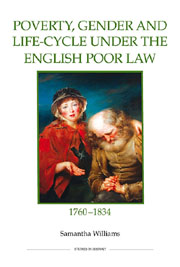Book contents
- Frontmatter
- Contents
- List of figures
- List of tables
- Dedication
- Acknowledgements
- Abbreviations
- Map 1 Bedfordshire, c.1834
- Introduction
- 1 People, place and poverty
- 2 Policy and paupers
- 3 Paying for poverty
- 4 Gender, life-cycle and the life-course
- 5 Work, unemployment and the makeshift economy
- Conclusion
- Bibliography
- Index
Introduction
Published online by Cambridge University Press: 05 February 2013
- Frontmatter
- Contents
- List of figures
- List of tables
- Dedication
- Acknowledgements
- Abbreviations
- Map 1 Bedfordshire, c.1834
- Introduction
- 1 People, place and poverty
- 2 Policy and paupers
- 3 Paying for poverty
- 4 Gender, life-cycle and the life-course
- 5 Work, unemployment and the makeshift economy
- Conclusion
- Bibliography
- Index
Summary
‘The poor of the parish crowded upon us.’
This book is about the poor and their families during the last three decades of the eighteenth century and the first three and a half decades of the nineteenth, the final seventy years of the old poor law. This was a period of long-drawn-out crisis for the relief of the poor which resulted in an overhaul of welfare legislation in 1834 and the introduction of the New Poor Law. At its core is a micro-history, providing detailed case studies of poor relief and the makeshift economy in the two communities of Campton and Shefford in Bedfordshire. It may even be termed ‘micro-cosmic’ history, in that the local is the site for the consideration of much wider issues; it is a testing ground for research questions that can only be answered accurately by detailed analysis at the parochial, familial and individual level. However, it is also possible to move beyond the locality to the broader regional and national framework. Campton and Shefford can be placed in the much wider geographical area of south-eastern England, a largely agrarian region characterised by high poor law spending, effectively the heartland of the ‘poverty problem’. It was concern primarily about spiralling relief costs in this region that prompted the Poor Law Amendment Act of 1834.
A number of issues within current historical scholarship are pertinent to this study: the implementation and growth of the poor laws, the ‘mixed economy’ of social welfare and the related concept of the ‘economy of makeshifts’, and the economic impact of the poor laws, as well such wider questions as the ‘politics of the parish’ and the gendered and life-cycle nature of poverty.
- Type
- Chapter
- Information
- Publisher: Boydell & BrewerPrint publication year: 2011



